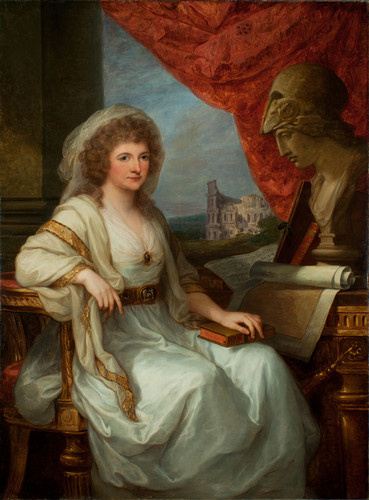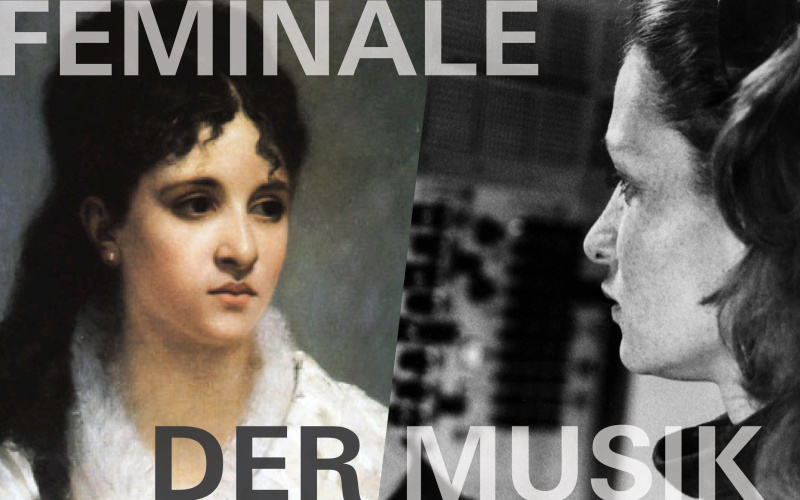Anna Amalia of Braunschweig-Wolfenbüttel
Feminale of Music
Anna Amalia of Braunschweig-Wolfenbüttel is a regent, patron and female composer. The art-loving musician becomes Duchess of Saxony-Weimar-Eisenach through her marriage to Ernst August II. Konstantin Duke of Saxony-Weimar-Eisenach.
Anna Amalia is born on October 24, 1739 in Wolfenbüttel, Germany. In her childhood she receives instrumental lessons at an early age and learns to play the harpsichord, piano, flute, guitar and harp. Her biography can be divided into three major periods in which she influences the intellectual life of her country: as regent (1759-1775), as founder of the Weimar »Court of the Muses« (until her Italian journey in 1788) and later as the preserver of her life's work.
During her reign, in addition to the representative public concerts at court, private musical evenings are also held in a small circle. Although there are restrictions due to financial austerity measures, such as the reduction in the size of the Court Chapel, music is always an integral part of the court in Weimar. After her son Carl August takes over the regency of the duchy in 1775, Anna Amalia is able to devote herself to her private interests. During this time she gathers a circle of artists, writers and scholars from various fields of art and science around her, with whom she regularly meets for exchange. Although she is not involved in the appointment of Schiller, Goethe and Herder to Weimar, the cultural and musical heyday of Weimar in the late 18th century can be attributed to Anna Amalia.
In addition to composing various instrumental and vocal works, of which the setting of Goethe's »Erwin und Elmire« from 1776 and »Das Jahrmarktsfest zu Plundersweilern« (1778) are noteworthy, she also devotes herself to theoretical writings on music. Thus, two treatises by Anna Amalia have been handed down, on the one hand the music-theoretical writing and on the other hand a music-aesthetic reflection with the title »Gedanken über Musik« (Thoughts on Music). The spread of the guitar in Germany is also partly due to Anna Amalia, as she brings a guitar with her from Italy, has copies made by the guitar maker Johann Jacob Otto, and in turn leaves them to other noblemen who introduce the guitar in Dresden, Berlin and Leipzig. After 1790 Anna Amalia refraines from public appearances at court and only performes in private circles.
Music pieces
Overture from the opera »Erwin and Elmire«, published by and recorded by the Academy of Ancient Music at All Hallows, Gospel Oak, London, as part of the AAM project »From Her Pen« (2018-19), which examines the work of historical female composers: Richard Egarr (conductor) and Bojan Cicic (director).
»Ein Veilchen auf der Wiese stand«, published by and played by Duo con emozione
»Erwin and Elmire«, Entr'acte with violin solo, published by KuhlauDilfeng2 and played by the Thüringisches Kammerorchester Weimar conducted by Martin Hoff.
Divertimento, for piano, clarinet, viola and violoncello, Allegro, published by Luigi Magistrelli and played by Il Cenacolo della Chimera Ensemble to be found on Clarinet Repertoire of Women Composers
Disclaimer
-
Links to external websites of other providers
The ZKM’s express objective is the accuracy and current relevance of any information it makes available on this web site. Mistakes and ambiguities cannot, however, be fully excluded. For this reason, the ZKM is unable to fully guarantee the current relevance, accuracy, completeness or quality of the information it makes available. The ZKM is not subject to coercible legal rules and regulations and to any kind of damages of a material or immaterial nature that may possibly be caused by the use or non-use of the information provided, including free downloads. The ZKM reserves the right to change or delete, to temporarily or permanently suspend access to the web sites at any time.
The responsibility for »external content« to which access is made, in the form of e.g., links, presupposes, among other things, positive knowledge of illegal or punishable content. The ZKM has no influence on this external content and entirely distances itself from such content. Should the displayed external web site include unlawful or offensive content, the ZKM expressly distances itself from such content. When made knowledgeable of such content, the ZKM will deactivate the corresponding link. The same holds for external entries contained in Blogs and discussion forums, links directories, mailing lists and all other forums of databanks operated by the ZKM, the content of which is rendered possible via write access.
All content of the present web site (texts, images, video stills, videos, audios, graphics etc.), the structure as well as the layout of this web site is protected by copyright. These contents, and the information made available by the ZKM (e.g., text and image materials) are available exclusively for individual usage by users of this web site, and not for commercial purposes. These contents may be distributed and copied, made public on the Internet and used for commercial purposes only with the prior consent of the ZKM. Similarly, the placing of deep links, inline links, frame links or similar links in which the ZKM web site is not clearly evident as source, is permitted only with the prior consent of the ZKM. Messages and references to content »share« in social media (e.g. Facebook) do not come under the proviso of this reserve approval. For press releases and photographs valid instructions for usage can be found at: www.zkm.de/en/press/service.
All labels and trademarks named and protected by third parties are subject to the unreserved stipulations of the respective registered owners. That trademarks are not protected by third part rights cannot be assumed merely by mention of the name.
This disclaimer is to be understood as part of the ZKM’s Internet content. In so far as part or single formulations of this text do not, are no longer or are do not entirely correspond to this legal provision, the remaining parts of this document remain unaffected in its content and validity.

